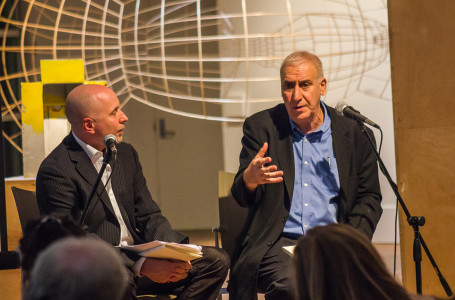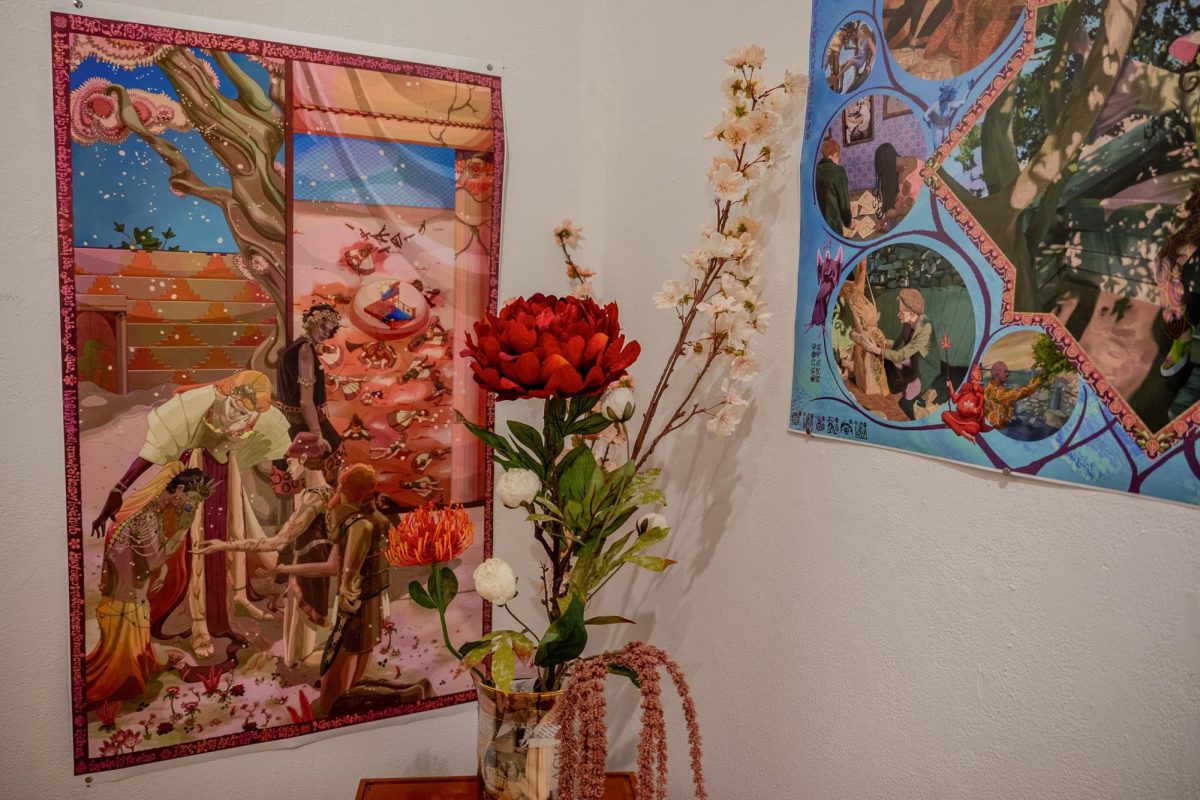Emma Friedlander
friedlan@grinnell.edu
Grinnell College welcomed renowned poet and alumnus Edward Hirsch ’72 as part of the Writers@Grinnell series yesterday, Oct. 8. Hirsch’s visit featured a roundtable discussion with students and faculty and a conversation with Professor Ralph Savarese, English, in Faulconer Gallery, which focused on Hirsch’s most recent work, “Gabriel: A Poem,” a book-length elegy to the poet’s late son.
The event in Faulconer Gallery coincided with an announcement by President Raynard Kington introducing the Armando Alters Montaño Writers@Grinnell Endowment Fund. The fund was presented by Diane Alters ’71 and Mario Montaño, the parents of Armando “Mando” Montaño ’12 for whom the fund is named. Mando Montaño was a Grinnell College alumnus and aspiring journalist who tragically died in Mexico City, while working with the Associated Press, only weeks after his graduation. It stipulates funding for an annual Writers@Grinnell event to bring in a nonfiction writer to speak and work with The Scarlet & Black newspaper and provides for student internships in media.

The dedication of the memorial fund added a meaningful note to the subsequent reading and discussion of Hirsch’s poetry.
“I think ‘Gabriel’ really speaks to how [Mario and I] felt about Mando’s death,” Alters said. “I’m just so happy that [Hirsch] was able to come here and give such a personal explanation of his poem. Gabriel died a little bit less than a year before Mando died.”
Hirsch’s “Gabriel: A Poem” memorializes the life of his son, Gabriel, who died on Aug. 27, 2011, at the age of 22, from cardiac arrest after taking a club drug at a party. Through relating the story of Gabriel, the poem also explores the greater themes of parenthood, disability and the universality of grief.
“One of the things I love about ‘Gabriel’ is its ferocious honesty,” Savarese said during the event. Savarese related Hirsch’s work to his own memoir about parenting an autistic son and went on to ask Hirsch about the struggle of conveying an honest portrayal of his son through poetry.
“Whenever you’re writing about other people, they’re exposed,” Hirsch said during the conversation. “I had written very little about Gabriel while he was alive. After he died, I felt this tremendous imperative to write about him. It was hugely controversial within my own family. The division I felt in myself is this: you cannot write a book like this unless you’re going to be truthful. If you can’t be truthful, you shouldn’t write it. On the other hand, he left such a little mark on the world that I couldn’t bear for him to be forgotten. I had to try to remember him, and remembering him was remembering how he actually was. Some of these things he would be proud of, some of them he would not be, but that’s part of the pact you make.”
Despite the serious subject matter of “Gabriel,” the excerpts read from the book and the conversation between Hirsch and Savarese revealed the humor that nevertheless pervades the work.
“He was a person, he wasn’t a text in a poem,” Hirsch said. “He’s so funny and outlandish, and the shit he says … it made me laugh when I was writing it. I keep trying to get him right, I keep trying to get to the heart of what he was like.”
Hirsch stressed that although “Gabriel” relates his personal experience of grief, he recognizes the universality of that sentiment. In writing about the loss of his son, Hirsch turned to other poets throughout culture and history who also lost children and wrote about parenthood. These literary allusions feature dominantly throughout the text of “Gabriel.”
“I threw myself into learning about other poets and the history of poetry,” Hirsch said. “Who in the history of poetry had lost children? I encapsulated their biographies in what I had written about the loss of children. I would accumulate these stories and it became a sort of chorus, a community. You talk about a second family, but one across time and across culture … It was helpful to me.”
Hirsch has read other poets widely since he started writing at Grinnell. At the roundtable discussion, Hirsch related his experience of reading and experimenting with poetry at Grinnell in the 1960s and 70s.
“Ever since I started out at Grinnell, I’ve felt companioned by poetry,” Hirsch said during his roundtable discussion. “Poetry connects us one to one. You’re by yourself, but you’re also with the words of another person. Poets are readers who have spilled over, readers who have been so moved that they want to respond in kind.”
By engaging with historical poets from Ben Jonson to Anna Akhmatova in “Gabriel,” Hirsch enters into a universal dialogue about grief and suffering.
“Everyone is carrying around huge bags of cement,” Hirsch said. “You just can’t see them.”
























































